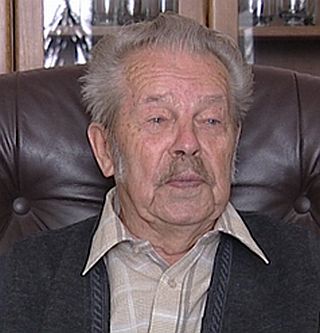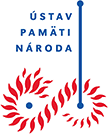Ján Okoličáni (1918)

Biography
“You could loose your property, but you could acquire it again. Although, in case you loose your honour, you could never buy it again, you could find it nowhere.”
Ján Okoličáni was born on June 6, 1918, in the village Okoličné in Liptov region as the only child. His father died when Ján was just thirteen-year-old boy; therefore, his mother alone raised him strictly to be honest and fair-minded man. Yet in his childhood he felt love for nature and hunting, what helped him later in his life a lot. He studied at the state grammar school in Liptovský Mikuláš and after the school leaving examination in 1937 he enrolled at the Agriculture and Forestry (Engineering) School of Higher Learning (VSZLI) in Prague. However, the beginning of the Second World War meant for him the end of his studies. In 1939 he received call-up papers and had to join up. He experienced many battles, fierce fights, hard living conditions and severe winters on the eastern front. After coming back home, he worked at the military school in Nitra where he witnessed careless handling of weapons. As he was a soldier, he took part in all the events following the Slovak National Uprising outbreak. He risked his life many times when he fought for his homeland against German armies. After coming back to his hometown, he started to farm at the destroyed family homestead. However, when it started to flourish, the year 1946 and the first post-war elections came. Then the left-wing government took the power. In the frame of collectivization they deprived him of the whole his property in a single moment. Zealous farmer suddenly transformed into a public servant. Moreover, about the year 1950 he had to face also an attempt to conscript him back to the army. He was intent on doing anything necessary to avoid being sent back to the front. For some time he worked as a liquidator of invoices at the Directorate of State Forests and Estates, but as there were some discrepancies in paying off the invoices, he asked to be relieved of his post. His wife’s friend helped him to find a job as a woodworker. In spite of many health problems and impending invalidity he kept working there till he was retired.
Leaving for Front without Saying Goodbye to Mother
“I didn’t have enough time to say anything to my mother who was at home, as I remember. It was on the railway station in Okoličné. I had some acquaintances there. I knew the watchmen. I packed a slip of paper into a small brick and threw it from the moving train. I told the watchman, whose name was Mr. Baran, actually, I shouted at him: ‘Mr. Baran, I threw a slip of paper on the ground, please, find it and deliver it to its addressee.’ Only then my mother came to know, well, it’s hard to speak about it, only then my mother came to know what had happened, where I had gone, you know, pardon me, but I am close to tears when I recall it. My mother stayed alone.”
Two Faces of War
“You know, there were various episodes, for example, at a stack of straw that was more than one hundred meters long. On one side there were Russians who warmed themselves and we sat on the other side. We weren’t forced to fight against each other or something like that at all. Moreover, sometime in the morning a man went out of the trench and said: ‘Ivan, give me a mouth harp.’ We could hear it because we weren’t too far from them. And he jumped up and played just like nothing had happened. We experienced days like this one, too. Yes, we did. But other days were really hard. Once, our mates went to do a field research. It didn’t end up well. I don’t know what they found out, but in front of our military positions there was a man lying on the ground unable to move. The most probably he was badly hurt. He had penetration wound of stomach. At least as I found it out. Nobody wanted to go to save him. So I went there along with my friend Fero Zámita. Oh no, Fero Zalán was his name. He is no more in the land of living. Well, we dragged that man to our trenches. I don’t know how or where it had happened; I simply put him on my back and dragged him. I wanted to take him to our trenches for treatment. I saw that he was bleeding from his stomach, but I also found out that his arm was shot through somewhere above the wrist. I hadn’t seen it before. I don’t know when it had happened to him. His back was probably wounded, too. Who knows? And, unfortunately, I witnessed there a really strange attitude of military doctors. I don’t know the doctor’s name, but in my opinion that man wasn’t hurt so badly, they should only treat him in a proper way. But the doctor, who was the most probably under the influence of alcohol, refused doing anything. ‘What are you bringing to me?’ he said. I was really shocked. Maybe I even said a swear word there at the aid station.”
Hard Times on the Exercising Ground
“I don’t know the exact date when I came to that military school in Nitra. However, I was also glad to leave it. Because they trained some intelligence division there that could be sent to the front. Actually it wasn’t a part of our army unit; we were a separate unit of attack. I came to know and witnessed that they used to train how to charge and discharge a cannon using the live ammunition. It was strictly forbidden thing. It was a waste of words warning the commanders. They only said: ‘Our soldiers can handle it.’ and the like. I can’t recall the names of those commanders. Ultimately, they weren’t my commanders. Finally there was a big bang and some anti-tank bombshell nearly hit the carter who was on the field at that time. It was necessary to find it, but I don’t know how it finished. So this was the irresponsibility as for the gun handling.”
Retreat Combat during the Slovak National Uprising
“I was fortunate that I knew mountains. You know, hunting helped me a lot in this case. Well, I headed to Korytnica. The weather was horrible, cloudburst, snow, rain, everything possible. I wore leather jacket because I thought it would be waterproof. But it wasn’t. It was pretty heavy; however, I didn’t throw it away. I came to Korytnica and thought what I would do next, because I was sure that they would occupy Korytnica as well. I was one hundred percent sure. They took Ružomberok. And they would certainly reach Korytnica. So I went up the valley called Korytnická dolina to the crest of Prašivá. On Prašivá I was totally exhausted. I was at the end of my tether. I was tired, hungry, exhausted and the like. And I met some helpless soldiers there. ‘What are we going to do, lieutenant?’ But they also asked me: ‘You aren’t wearing your rank, are you? Throw it away, cut it off or otherwise Germans will kill you.’ I agreed with them, threw it away but then also other men tagged along me as they saw that I knew a lot about mountains.”
Wrongfully Sentenced
“I came home; and actually, I came to jail. I was labelled as partisan, no partisan, the SS man. I was labelled as the SS man, somebody informed on me. And then it took about one month that I was detained. Sister of Braňo Rapoš used to bring me some food to the former District Court. It went this way until I grew weary of it and told that police officer the name of a man who should they refer to. They contacted the Armoured Regiment (PÚV), the lieutenant colonel. I think it was lieutenant colonel Kuchta, the instigator of the Uprising in Martin. You know, I was also indirectly engaged in the preparation of the Uprising and thus he asked them: ‘Which one of you had arrested him?’ He came to Okoličné to lick the situation into shape.”
How to Become a Beggar in Two Hours
“Once, it was the time of haymaking, I came home and I wanted to prepare a straw blower, to put it a bit further to fill up our sheds. When I did so, a local servant Janko came: ‘Some men came and call you to come there.’ I was a friend of everyone in the village. I went there and I saw Mašlonka, brother of former football reporter. He stood there along with a committee of comrades. ‘We came here because we had decided or rather the Party had decided that you are not capable of keeping your homestead, and socialist husbandry needs sustenance. It needs to keep homesteads trim to the state’s profit. And you are not capable to ensure it. Thus we are here to nationalise your property.’ It took only two hours and then I became a beggar.”
A Model Worker
“Strangely enough, since I worked in the factory Nový domov (New Home) I was probably some record-breaker or what because I was always decorated for a good work. They always declared me a model worker, till today I have all those honours, but they are put somewhere, I don’t know where because I don’t use them. This way I came to the fore. Not only management of that enterprise and workers engaged in politics, but also party officials put their faith in me and then I could start working calmly.”
“I Fought Tooth and Nail.”
“[A military doctor] wrote that letter right after the medical examination and gave it to me. It was sealed. He told me: ‘Here is your medical report, hand it to the Military Administration in Liptovský Mikuláš.’ I knew that he found me fit for military service, at least I assumed it. And I was curious. I managed to unglue that letter and read the report. He vindicated all the findings of civilian röntgenologist such as duodenal ulcer and the like. However, he also wrote there that he found no obstacle as for enlisting the military service. I didn’t know what I should do. I was really desperate, so I ventured to do something for what I could have been shot dead. I took the military report out of the envelope and threw it to sewer because this way I wanted to avoid changing my mind and going in search of it. Well, I took the civilian doctor’s report out and put it to the envelope instead of the military papers.”
The story and videoclips of this witness were put together and published thanks to the financial support of EU within the programme Europe for Citizens – Active European Remembrance.

